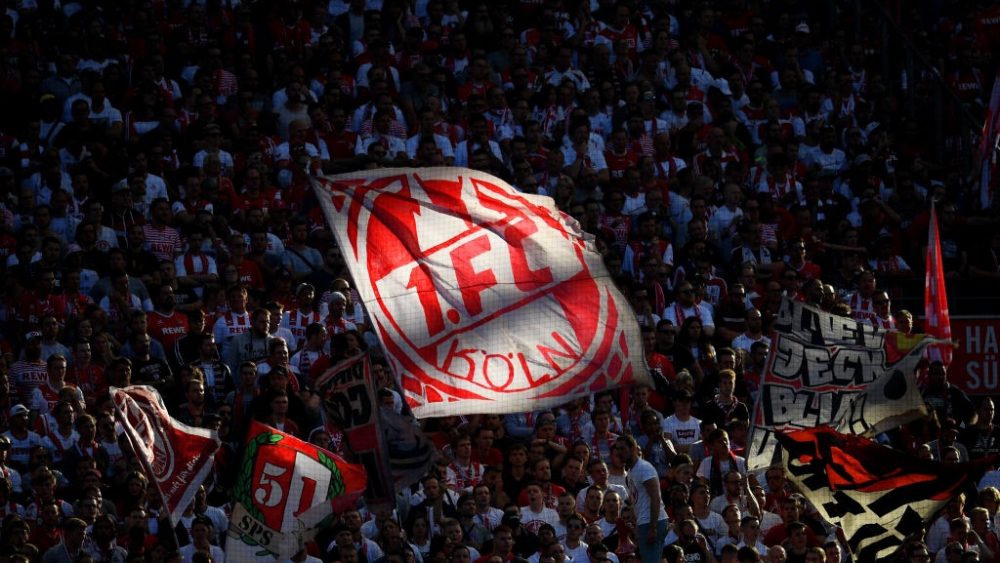Bundesliga MD05 Preview: Bayern against Cologne
Cologne has had a difficult start to their first season after being promoted last year. They currently are 15th in the table with three points, having lost their opening two matches against Wolfsburg and Dortmund, followed by an important win against Freiburg and another loss against Gladbach in the Rhineland derby.
Cologne’s opening fixtures have already been packing a punch – and now they have to make the trip to Munich. However, their last two away games to Bayern should give them hope: a draw in 2016 (1-1) was followed by only a narrow defeat in 2017 (1-0).
Their performance in the 3-1 defeat against Dortmund also proved that Bayern should not expect the usual visit of a newly promoted underdog who comes to lie down, accept a drubbing, and then turn their mind to more important games.
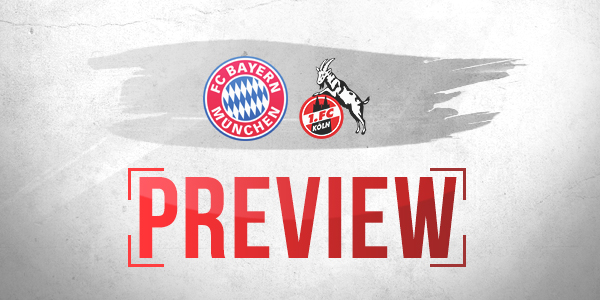
FC Cologne: here to stay
It was crucially important for Cologne to secure last year‘s promotion for several reasons. For one, Cologne see themselves as a natural Bundesliga club, a view that is also widely shared among their fans. So the return was important to satisfy their own ambitions as well as those of their supporters. Second, a promotion this season would arguably have been much harder in light of opposition like Stuttgart, Hamburg, Nuremberg, and Hannover in the 2. Bundesliga.
The promotion has been especially important for the club‘s finances. Cologne has now the unique opportunity to financially pull away from their closest competitors. They occupy the 15th spot in the current TV money table with revenues of €38m, ahead of Dusseldorf (around €32m), Union Berlin (around €29m) and Paderborn (around €26m). Stuttgart, on the other hand, sits atop the 2. Bundesliga table at only €24m.
If Cologne manages to stay up this season, their financial advantage will increase even further. Thus, staying up would provide a significant boost to their chances of becoming a long term member of the Bundesliga. Yet, they will have to earn their keep not just against the aforementioned teams, but also Mainz and Augsburg, who are considered relegation candidates this season.
Continuity despite a new coach
In contrast to several other clubs who commonly swing back and forth between the first and second division, Cologne managed to hold most of their team together and strengthen it in important positions. In Ellyes Skhiri (aged 24; €6m), Sebastiaan Bornauw (aged 20; €6m), Birger Verstraete (aged 25; €4m), Kingsley Ehizibue (aged 24; €2m) und Kingsley Schindler (aged 25; free transfer), five new players arrived in the summer, all of whom have all played almost every minute of every competitive game so far this season.
It is obvious that new coach Achim Beierlorzer puts considerable trust in his new players and gives them plenty of game time straight away. Beierlorzer’s preferred formation is a 4-4-2 with two holding midfielders, which he relied on in four of the first five matches. Only against Wolfsburg he opted for an additional midfielder while sacrificing a striker (4-2-3-1).
Beierlorzer’s predecessor Markus Anfang tried to implant a possession-based game geared to creating chances from longer phases of control in his team. As a promotion favourite, this seemed a reasonable thing to do. Beierlorzer is faced with a different kind of challenge now, and while his team was considered to be among the league’s strongest last season, it is now seen as a bottom third dweller. Beierlorzer has reacted to the new situation by largely parting ways with Anfang’s ideas and introducing a new kind of football at Cologne.
More direct play, more gegenpressing
Cologne seems to no longer put as great an emphasis on an organised build-up play as last season. Instead, their game is marked by frequent long balls forward with the intention of winning second balls or that a cologne player manages a knock-down to one of his teammates who is pushing up. With 76 long balls per 90 minutes, Cologne leads this particular Bundesliga ranking ahead of Dusseldorf (72), Frankfurt (66), and Freiburg and Union (64 each).
One could argue that this could be due to their challenging first run of games, but even against Freiburg Cologne drove 85 long balls. The team’s focus clearly is on bridging the second third as quickly as possible and creating chances through players rushing up in gegenpressing.
Cologne’s match against Dortmund provides ample study material in this regard for Bayern to go over. Cologne managed to keep Dortmund at bay for long stretches of the game while having only 26% of possession. Beierlorzer opted for a tactic of occupying the center to prevent Dortmund from using their usual method of deep passes through the middle which are deflected back to a teammate as well as their lethal final pass in behind the defensive line.
Unfortunate defeat against Dortmund
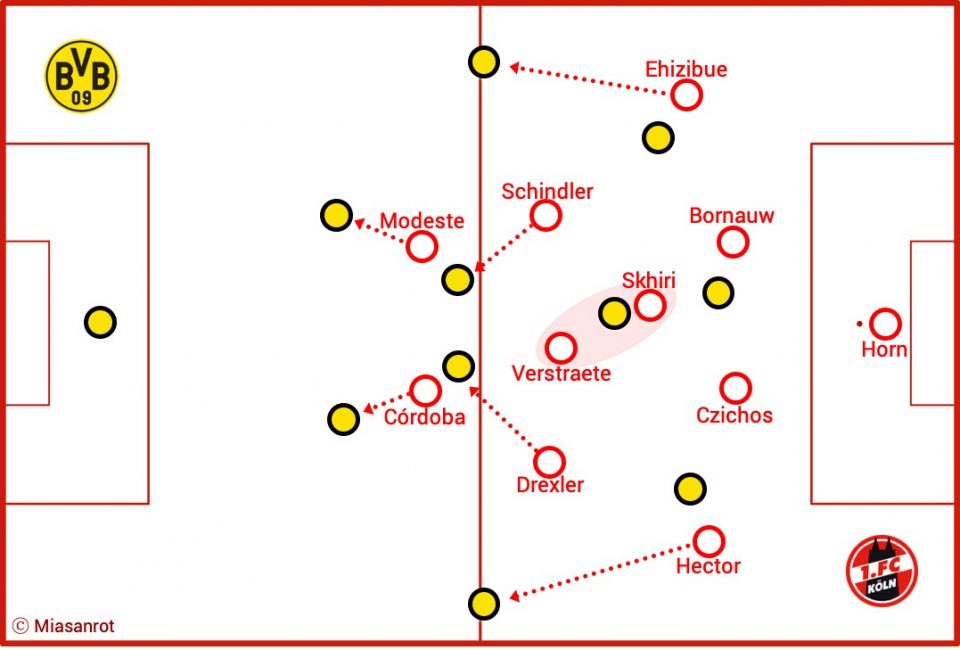
When Cologne’s pressing took place in midfield, they switched from a 4-4-2 to a 4-2-3-1. Skhiri and Verstraete took charge of attacking the central playmaker position, where Marco Reus plays an important role for Dortmund. In addition, they tried to disrupt Dortmund’s build-up play by creating an overload in the centre (mostly five against four) and by aggressively closing down Dortmund’s midfield players.
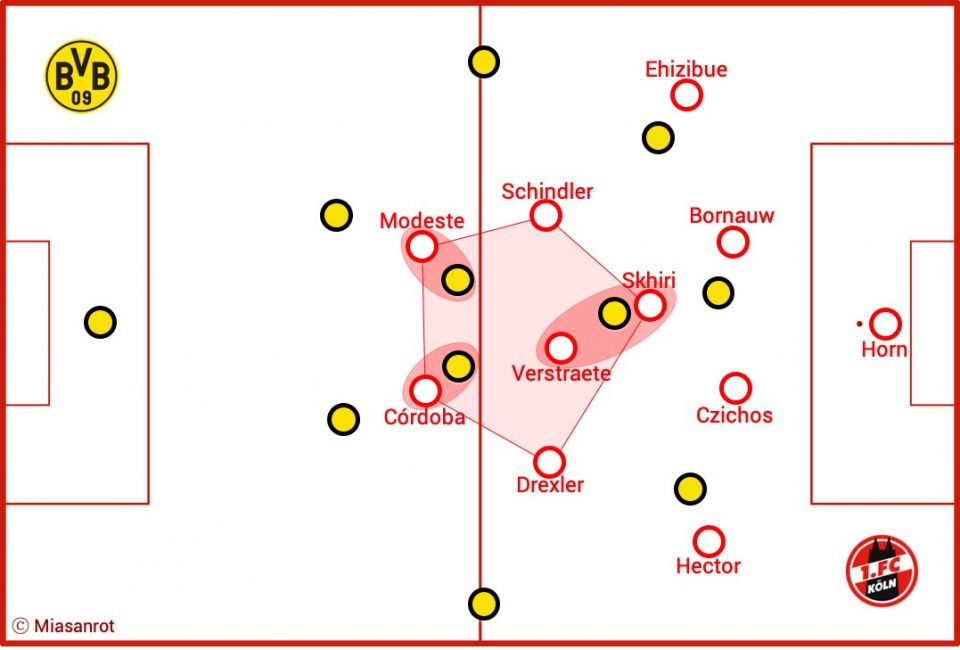
When Cologne opted for zonal pressing, they always tried to minimise the distances to Dortmund’s players. In the area depicted in red in the graphic, Cologne kept a compact shape and were always close to Dortmund’s three playmakers. When one of Dortmund’s full-backs got hold of the ball, Hector and Ehizibue moved up and Cologne’s two number eights blocked the passing lanes in the center.
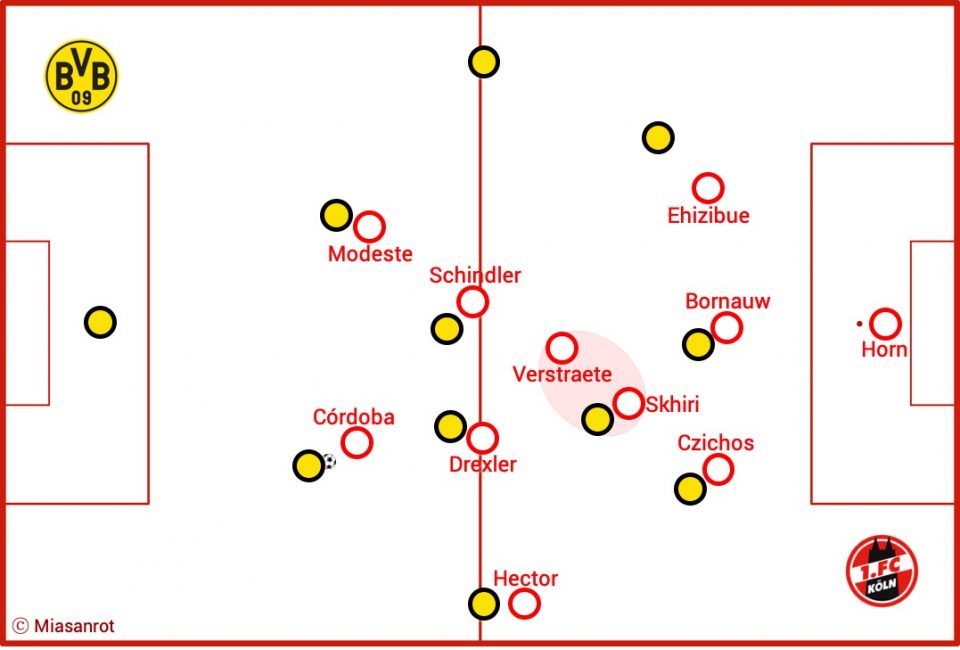
Cologne clocked 115.2 kilometres during the game, most of which were a result of constantly shifting back and forth to always have more men than Dortmund near the ball. For a long time, they did this superbly. According to several xG metrics, the game was about equal up to the 80th minute. “Understat”, for example, recorded a 0.82 to 0.86. But it was already around the 60th minute that Cologne’s high intensity started to take its toll. Dortmund increasingly had more room and Cologne seemed to have reached their limits. When Favre brought on Brandt and switched to a 4-3-3, Dortmund finally was the dominant team.
However, the 3-1 scoreline does not do justice to Cologne’s performance. They invested a lot in the game, played with high intensity and were always willing to make the necessary runs. Their undoing was that they lost too many of the key duels. If Cologne’s performance against Dortmund is anything to go by, Bayern will have to be prepared to meet a side that’s not above constantly hunting for the ball. They should exploit this by keeping Cologne busy with a high tempo game of their own and wait for them to wear themselves out.
FC Bayern: patience is the name of the game
Bayern delivered a decent performance against Red Star in the Champions League. They had a variety of different means at their disposal to open up Red Star’s massed defense. One of the tools they had already used against Leipzig was a combination of a long vertical pass up high by a deeper player that is deflected back to the originator of the pass, who has been rushing up the pitch in the meantime.
Philippe Coutinho tried to do this a number of times by acquiring the ball deep and directly looking for the vertical pass forward to make ground afterwards. Bayern thus created a lot of useful attacks, for example the one leading to the offside goal by Coutinho in the 40th minute.
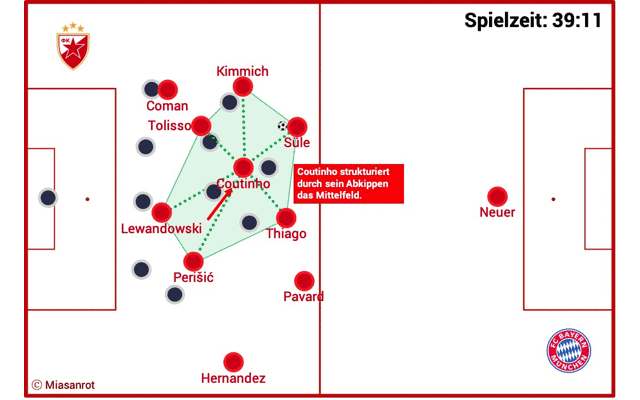
First, Coutinho set up the attack by positioning himself in a way that enabled many of this teammates to link up with him for passing. When he received the ball from Süle, he directly headed off in the direction of the opponent’s goal. Lewandowski made himself available between the lines and was promptly given the ball by Coutinho, who did not end his run but continued to charge down on the opponent’s goal at full tilt.
Lewandowski, instead of returning the ball to Couthino, decided to dribble out to the right and roll the ball into the path of the advancing Coman. Coman took the ball and made a beeline for the centre where he crossed Coutinho’s trajectory who was still running at pace. Then Coutinho scored with his back heel from a simple lay-off by Coman.
Even though the goal was ruled offside, it is a prime example for Bayern’s efforts to create chances by playing through the centre and half spaces. Coutinho obviously has had an immediate impact on Bayern’s game, although the team has only just begun to get accustomed to his style of play. However, if early signs are not deceiving, Coutinho could be a great boon to Bayern.
Less frenzy against Cologne
Against Cologne, it will be important for Bayern not to let themselves be pushed out wide early. This is exactly what the visitors are going to try in order to create situations of numerical advantage on the wings. Bayern should avoid this by keeping the game to the center. In order to do so, they will need to play an effective ball game involving the half spaces and keep a compact shape when shifting to follow the ball.
One of Bayern’s main problems against Red Star was their lack of patience. They often went for an early high cross or sought an early finish as soon as they arrived in the penalty area instead of trying to hold on to the ball and produce better opportunities. This lead to a few intervals of a hectic back and forth of possession between the two teams during the game. Cologne might well have taken greater advantage of such situations than Red Star was able to to.
If however Bayern keeps their cool and consistently moves the ball about at pace, Cologne will feel the effects of this sooner or later. Especially if Bayern does not manage to score an early goal, it will be all the more important for them to remain patient. The more they move the ball while Cologne move their players, the earlier the visitors will get tired. By the same token, moving the ball and cleverly switching play will also be crucial in breaking down Cologne’s defense.
A championship is lost against the big teams but won against the small ones
Being patient will be key to winning for Bayern. If they approach the game thinking that, well, one of their 50 or so crosses will result in a goal, they will have a dangerous time. Interestingly, Bayern has failed against newly promoted teams more than once in recent years. Last season they did it twice. In their home game against Dusseldorf (3-3) and their away game to Nuremberg (1-1). In their last 31 games against promoted teams, however, they only experienced one really epic disaster, which came in May, 2018 against Stuttgart (1-4).
The team should be warned, not least because of their weak phases against Red Star. Any team that hopes to raise the “Meisterschale” at the end of a season will have to reliably win their points against the smaller teams just the same as their closest rivals will likely do too.
Dortmund has already demonstrated this season that wins against the small teams are not a matter of course. They struggled against Cologne and lost against Union. This gives Bayern a real leg up in their chase for the title. After all, they won last season’s title on the back of their wins against the smaller teams. So one could say without much hyperbole that Saturday’s game against Cologne is an extremely important building block for Bayern’s chances of winning the title.



